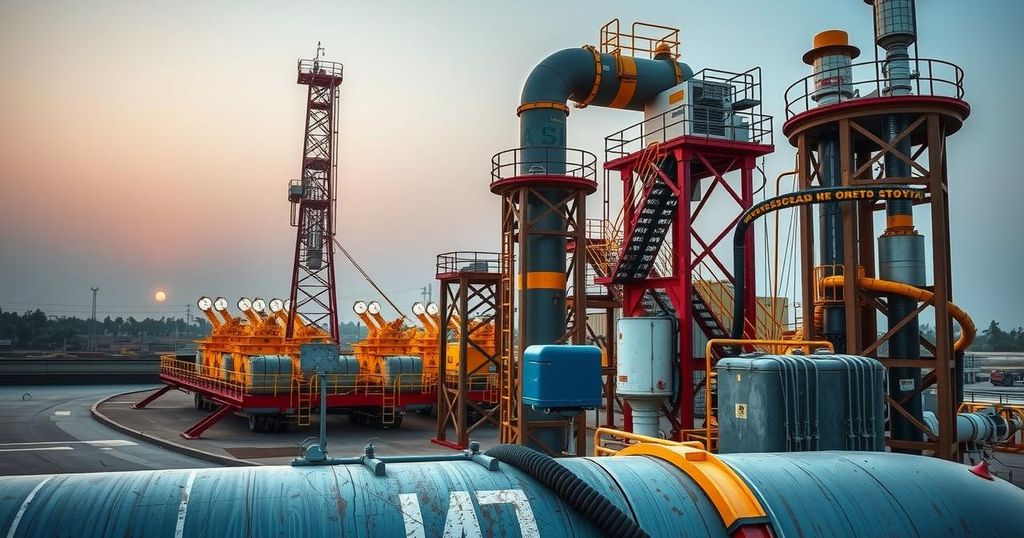South Sudan plans to resume oil production, targeting 90,000 barrels per day following a halt due to conflict in Sudan. The country heavily relies on oil for its GDP. Minister Puot Kang Chol emphasized the necessity of oil for survival, while residents face health risks from pollution. Environmentalists call for safeguards as production restarts, hoping it alleviates financial pressures for both nations.
South Sudan has announced its intention to resume oil production, setting a target of 90,000 barrels of crude oil daily. This announcement follows an extended halt in oil exports due to a conflict in neighboring Sudan, which invoked a force majeure clause that restricted sales since February 2023. With the lifting of this clause on January 4, 2025, South Sudan’s Ministry of Petroleum has confirmed that production will recommence as of January 8, 2025, providing a critical boost to the national economy reliant predominantly on oil revenues.
Minister of Petroleum Puot Kang Chol emphasized the significance of oil production for the nation and contended that South Sudan will persist in utilizing its fossil fuel resources, despite the global shift toward green energy solutions. He remarked, “Now, we are faced with the reality, and the reality is, ‘I go hungry, have no food, I will die.’” This statement reflects the duality of South Sudan’s struggles—economic necessity and environmental concerns.
In the capital, Juba, local residents are confronting health challenges attributed to longstanding environmental issues linked to fossil fuel usage. Betty Yobu, a restaurant owner, shared her health struggles due to toxic emissions from charcoal stoves, highlighting the public health implications of the country’s dependence on fossil fuels.
Environmental advocates have criticized the oil industry for its potential harm to both nature and human health. Joseph Africano Bartel, undersecretary of the Ministry of Environment and Forestry, has called for the establishment of environmental safeguards prior to the resumption of operations in certain oil blocks. As South Sudan seeks to maneuver through the complexities of its oil sector, optimism persists that renewed production will alleviate fiscal pressures on both South Sudan and Sudan while addressing pressing socio-economic needs.
The announcement from South Sudan regarding the resumption of oil production is pivotal given the country’s heavy reliance on its oil sector, which constitutes 90% of its Gross Domestic Product. Historically, South Sudan has faced challenges in exporting oil due to political instability and conflicts with Sudan, particularly during periods when Sudan invoked force majeure clauses that halted oil sales. The recent lifting of restrictions offers a new opportunity for economic recovery, although it raises questions about environmental safety and public health within the operational regions. As a country rich in fossil fuels, South Sudan is ranked third in sub-Saharan Africa for oil reserves, producing approximately 3.5 billion barrels annually. The friction between economic realities and environmental health exemplifies the broader global discourse on energy production and its sustainability, particularly in developing nations that depend heavily on fossil fuels for economic survival and growth.
In summary, South Sudan’s plan to restart oil production is a critical economic decision aimed at alleviating financial hardships faced by the country. The anticipated daily output of 90,000 barrels is essential for bolstering the nation’s economy, which has suffered due to the cessation of oil exports amid conflicts in Sudan. However, this move also raises significant environmental health concerns, highlighting the need for an equilibrium between economic development and community health. As South Sudan embarks on this renewed chapter, the hope is that it will navigate both fiscal and environmental challenges effectively.
Original Source: www.voanews.com






